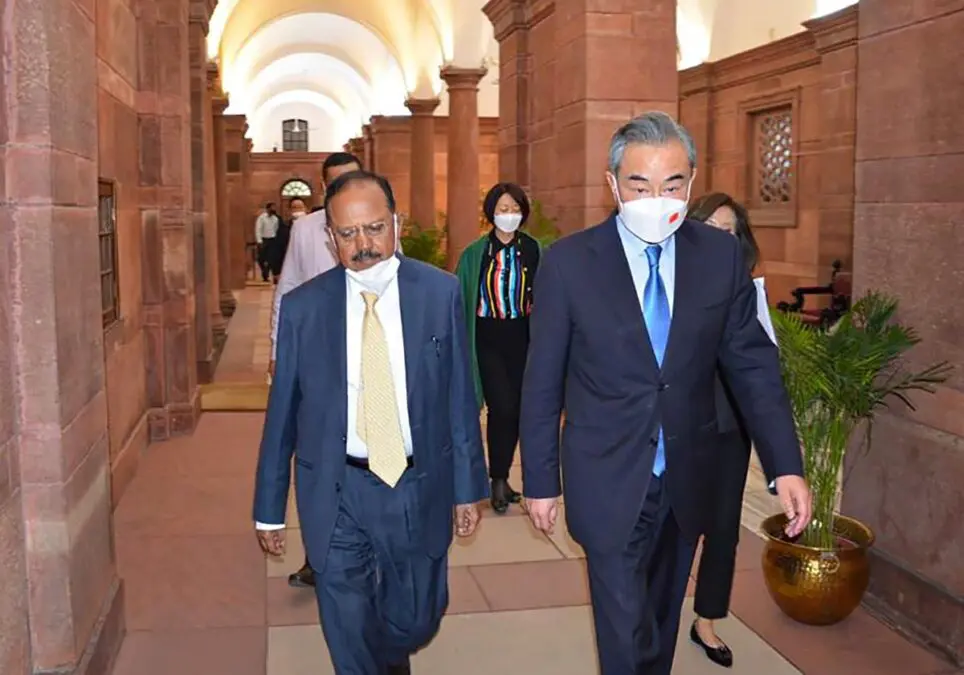By — Shyamal Sinha
Seven Tibetan protestors were detained for shouting slogans outside the Hyderabad House in New Delhi during the Chinese Foreign Minister Wang Yi’s official meet with Indian minister of External Affairs Dr. S Jaishankar on Friday. Hours later, all activists who were held at Mandir Marg Police station were released around 6pm as soon as the Chinese minister Wang Yi left the Indian capital.
The visit took place under an unusual cover of secrecy. The Ministry of External Affairs’ standard protocol for high-level visits is to make a prior announcement in coordination with the visitor’s foreign office.
There was no public announcement about the visit – either by India or China. Even after Wang Yi landed in Delhi and photos were published all over the media, there was no acknowledgment from the Indian or Chinese governments.
When asked why this happened, Jaishankar told the media that typically, such announcements were made at mutual convenience. “For whatever reason, the Chinese did not want this set of visits which Mr. Wang Yi did, to be announced earlier. So since we did not have a mutual agreement, we did not make our announcement,” he said.
There was no comment from the Chinese side on Jaishankar’s assertion that Wang Yi’s visit was kept deliberately below the radar.
With Wang Yi having attended the Organisation of Islamic Cooperation summit in Islamabad, cross-border from Pakistan was also on India’s list of discussion points. “It did come up, in terms of my sharing with him, what is the Indian view of the concerns that we have in respect of Pakistan and, of course, what were some of the positions taken during the OIC meeting”.
On Wednesday, India had reacted strongly to Wang Yi’s reported endorsement of OIC’s views on Kashmir.
“I explained to him why we found that statement objectionable. So, it was a subject discussed at some length. There was a larger context as well. You know, I conveyed that we hoped that China would follow an independent policy in respect of India, and not allow its policies to be influenced by other countries and other relationships,” said Jaishankar.
“There was no contact with them since their arrest three hours ago. However, both the activists from SFT and others from Tibetan Youth Congress have now been released,” activist Tenzin Phakdon from SFT-India told Phayul. The Chinese foreign minister and state councillor landed in New Delhi on Thursday, marking the first high ranking Chinese leader to visit India since the standoff along the Line of Actual Control (LAC), and the clash between the two sides at the Galwan Valley in June 2020.
The activists had previously demonstrated at the airport with placards reading “Wang Yi, you are not welcome!”. Tenzin Lekdhen from SFT wrote, “Wang Yi has no right to talk on the Indo-Tibet border; Tibet’s independence is India’s security.” Tibetan parliamentarian Choedak Gyatso told ANI, “It’s important that the Tibetan issue is raised by both sides. Such a visit by the Chinese foreign minister is a good sign. It’s essential for the two giant Asian countries to maintain positive ties.”
Despite the protest and the subsequent arrests, diplomats from both sides seems to have brushed aside the Tibetan issue. The news reports today suggested that during the meeting with Chinese foreign minister, national security adviser Ajit Doval stressed the need for “complete disengagement” on Line of Actual Control (LAC) to allow the bilateral relationship to take its natural course, according to sources.

China’s foreign minister Wang Yi meets with national security adviser Ajit Doval, at the South Block, in New Delhi, Friday, March 25, 2022. Photo: PTI
Government sources stated that China invited Doval for the next round of meeting of Special Representatives. NSA responded that he was ready to visit China “after immediate issues are resolved successfully”.






